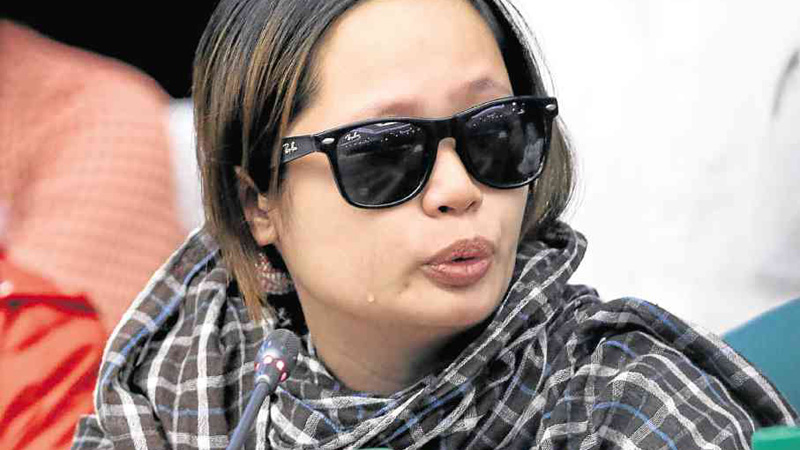
IN HIDING Harra Kazuo, wife of a slain drug suspect, testified before senators in August. —RICHARD A. REYES
When policemen shot and killed Harra Kazuo’s common-law husband and her father-in-law following a drug raid, she sought one thing: justice.
In a television interview shortly after their deaths in July, the 26-year-old mother accused two officers of killing them in cold blood.
In her testimony that was broadcast nationwide, Kazuo recounted the twin killings before a Senate committee investigating the brutal drug war.
What Kazuo has gotten instead, though, is a life lesson in the consequences of speaking out.
Today, she lives with her three children in hiding, sheltered by an extraordinary witness protection program run by the Commission on Human Rights (CHR), which has feared for her safety while it investigates the case.
That such a program exists is powerful indictment of the lack of trust many have in the country’s notoriously corrupt police, who are spearheading an antidrug campaign that has left more than 4,000 people dead in just a few months.
It also illustrates the failures of a broken justice system.
It’s not right
Kazuo said she was pushing the case because “what is happening is not right.”
“I want them to feel how they treated my husband,” she said. “I want them to feel what it’s like for a family to lose a loved one.”
Although both police officers have been suspended and have attended preliminary hearings, City Prosecutor Orlando Mariano said the two remained free and neither had been indicted.
If prosecutors determine the evidence is too weak, both men could end up being absolved.
CHR Chair Jose Luis Martin Gascon said no policeman had been charged criminally in court since the drug war began despite persistent reports of security forces summarily executing drug suspects.
Senior Supt. Dionardo Carlo, the Philippine National Police spokesperson, however, said some officers had been arrested and charged, but he could offer no details.
President Duterte unleashed his campaign to rid the country of narcotics immediately after taking office on June 30.
The effort has been praised by a population exasperated by corruption and crime, but it has been condemned by the United Nations, foreign governments and activist groups because of its staggering death toll and apparent disregard for human life.
Kazuo acknowledged that her husband was a small-time methamphetamine dealer.
But she insisted that he only pushed the drug because he could find no other work.
Suspected cover-up
Just before midnight on July 6, police raided their tiny one-room apartment in a slum in Pasay City.
The officers could not find any drugs, but they hauled 28-year-old Jaypee Bertes away anyway, along with his father, 49-year-old Renato.
When Kazuo visited them at a police station the next morning, both men were severely bruised.
Hours later—after she left—they were shot dead at the end of a narrow corridor, each three times.
Police said the men were killed after one of them attempted to grab a firearm belonging to the officers.
But CHR officials, who conducted their own forensics investigation, said the detainees had been beaten so badly that they could not have done so.
One of Bertes’ arms, they said, had been broken.
Not the first time
It wasn’t the first time a drug suspect was fatally shot in police detention.
Last week, a town mayor detained for illegal drugs and gun possession was killed by officers in a purported gun battle in his jail cell in Leyte province.
Sen. Panfilo Lacson, a former Philippine National Police chief, called for an investigation and suspects the mayor, Rolando Espinosa Sr., was killed to prevent him from implicating other officials in illegal drugs.
Gascon said the officers in Kazuo’s case may have killed her husband to cover any links that could connect them to drug crimes.
Kazuo said Bertes had met the two officers she accused at least once before, when he bribed them to get out of a previous drug charge.
Silence for good reason
The families of most victims in the drug war have stayed silent for good reason.
Media reported the story of one man who had doggedly pursued justice for months for his sister, who had been killed by unidentified gunmen in Manila.
The man, who was not under CHR protection, turned up dead in late October.
“I rarely go outside anymore,” Kazuo said. “I stay inside the house, sometimes I read books, love stories … I don’t even want to go outside and walk.”
Kazuo, who has a 2-year-old daughter and a 6-year-old son, gave birth to a boy in September. During a visit for a prenatal checkup, someone recognized her, prompting CHR officials to switch hospitals.
250 cases
The CHR is now protecting at least seven other witnesses in similar circumstances.
Its investigators are combing over 250 cases, many involving allegations that police carried out extrajudicial killings or other abuses.
They’ve received little cooperation from the PNP. An investigator assigned to Kazuo’s case said police had refused to release their autopsy report, so the commission conducted its own.
“It’ll get worse before it gets better,” Gascon said. “While [Mr.] Duterte is president, I do not believe people will be charged and held to account … so what we need to do now is to prepare the evidence for the time we can have a proper reckoning.” —AP